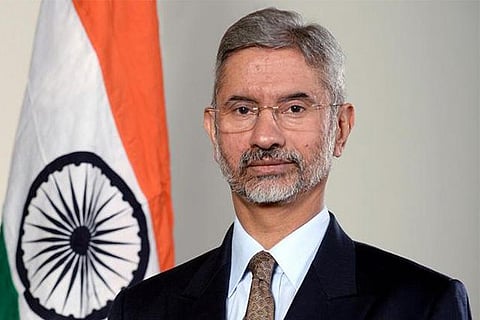

Chennai
“One of its consequences will be that those living in extreme poverty will increase for the first time in a quarter century. But there are other results as well, among them how countries perceive national security and global trade so much more differently than before,” he said. The additional stresses on the global system will surely aggravate its already difficult predicament, he added.
“We may be interacting in a hybrid mode, but in many ways, do so in a hybrid world. The old, the emerging and the ‘over the horizon’ co-exist and it is reading them right to draw policy conclusions that will be the real challenge that we will all face,” Jaishankar said.
“More countries count today than they did before; and naturally, we have moved from G-7 to G-20. But we also need to assign different weightages to different players; it’s not just the US and China but others including India,” he said. “The metrics of measuring power is now very different and not merely military but finance, trade, connectivity, data, technology and as it was discovered, even recently, masks and ventilators,” the Union Minister added.
“In my business, we call it multi-polarity, which means more players relevant to outcomes. And that obviously calls for a very different architecture from the times when there were two camps of the US and USSR or just the dominance of the United States,” he said.
He noted that a particular challenge for the international community is to come to terms with the sharper contradictions between the US and China and the consequent operational difficulties in the absence of common ground.
“What COVID-19 has gone and done is to give globalisation a much more existential meaning through health security, trade security and job security. If the world needs more trusted and capable players, India needs to primarily focus on the latter attribute since it is well regarded on the former score,” he said.
As a pluralistic and open society with a market economy, it is systemically in sync with the rest of the world, he said. Jaishankar noted that that even during the pandemic, India ramped up its pharmaceutical production especially of hydroxychloroquine and paracetamol to respond to growing global demands. “In fact, we supplied medicines to 150 countries, more than half on a grant basis. Our medical teams were deployed in four of our neighbours who were in distress. But as we learnt during this period, the challenges were much more of capabilities,” he said. The lesson is of an India with greater capabilities not just helping itself but being a force of good in international relations, Jaishankar said.
“And that is why the outlook of Atmanirbhar Bharat (self-reliant India) is important for the world. This is not about protectionism; it is about building greater strengths at home to play more effectively abroad,” he said. “We are today in the midst of making multiple choices. It would be relatively easy for us to just focus on recovery. In many ways, getting back to where we were before is a very natural human trait. But in this crisis, we have ambitiously taken the road of opportunity,” he said.
There was already a reassessment of FTA experiences, keeping in mind the damaging impact they have had on India’s manufacturing and the attention could now well shift to becoming part of global value chains rather than entering into more formal trading arrangements, he added. The minister also said that people are heading for a more fractured and complicated world, one with greater multi-polarity and less multilateralism. In all this change, the opportunities are certainly there; seizing them will be the real test of our mettle.
Talking about the Indo-US relationship, Jaishankar said most people would agree that one big inflection point in the relationship was then president Bill Clinton’s visit to India when Atal Bihari Vajpayee was the prime minister, another was the nuclear deal and Prime Minister Narendra Modi’s visit in 2014 was another one. If one looks at the US Presidents, Clinton, George Bush, Barack Obama and Donald Trump are such different individuals but all of them have been remarkably consistent in the priority to the Indo-US relationship. Same is on the Indian side with strong continuity through prime ministers Vajpayee, Manmohan Singh and Modi, in terms of deepening the ties, he said.Very deep convergence exists between India and US, he said, adding that though defence and security were an important aspect of the relationship, but it was one that was also people-driven.
Visit news.dtnext.in to explore our interactive epaper!
Download the DT Next app for more exciting features!
Click here for iOS
Click here for Android